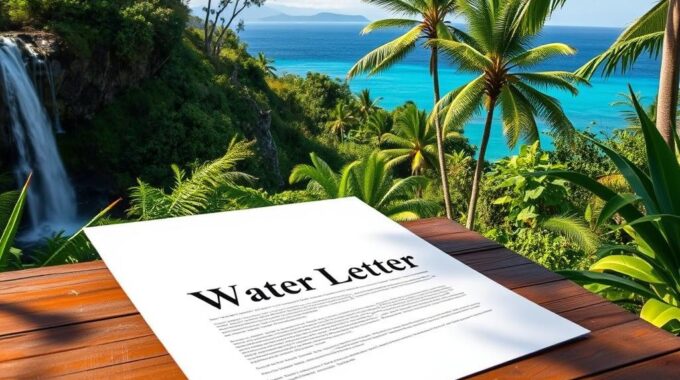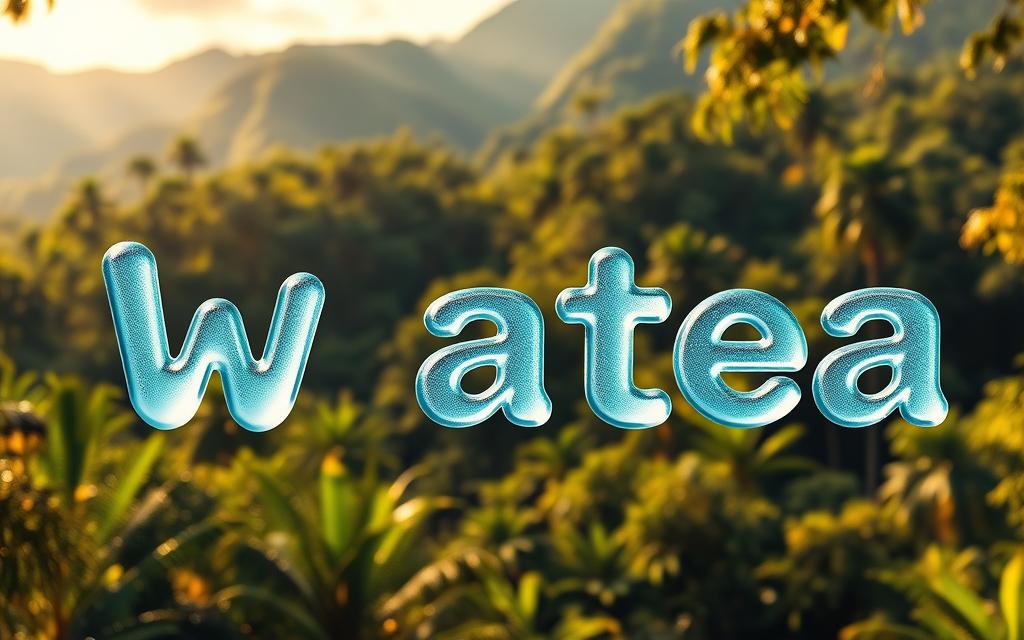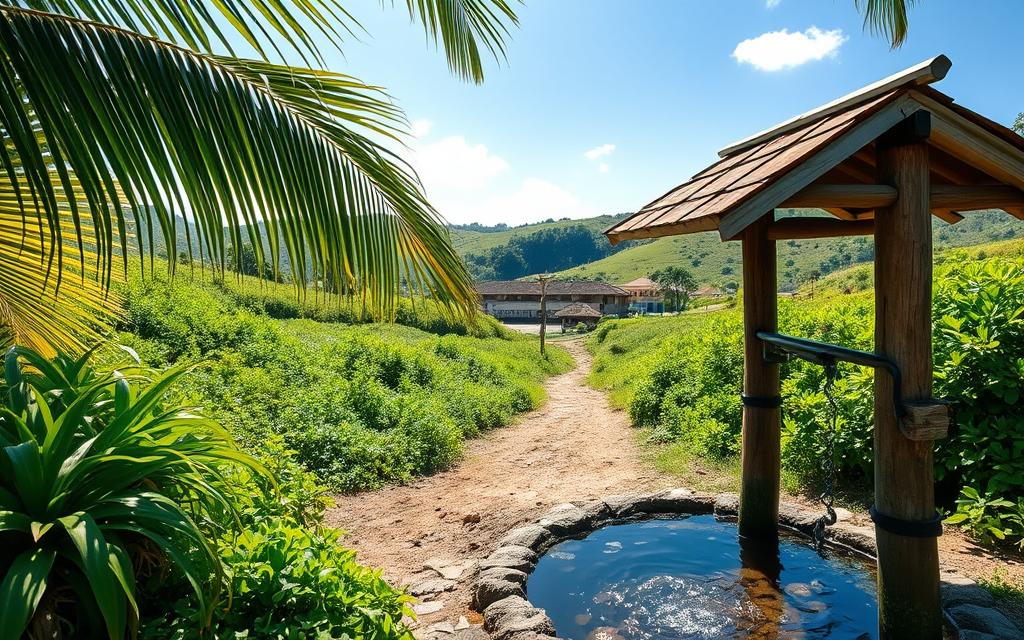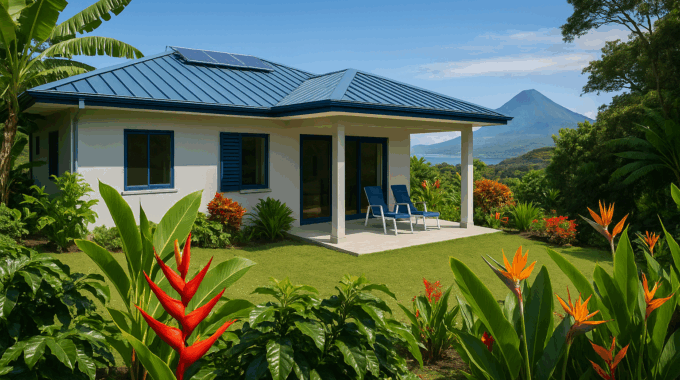Explore how a home equity loan can work for you in Costa Rica with our Home Equity Loan Advantages Explained, tailored for efficient borrowing strategies.

Water Letter in Costa Rica: A Crucial Building Requirement
In Costa Rica, a country renowned for its lush rainforests and abundant rainfall, access to water is a critical factor in property development. Surprisingly, having physical access to water does not automatically grant the legal right to use it for construction or other purposes.
We will explore the significance of water letters in Costa Rica’s real estate market, particularly how they impact the value and development potential of properties. The 2014 regulatory change that made water letters mandatory for new building projects has significantly affected how property owners and investors approach construction.
Understanding the role of water letters is essential for protecting investments in Costa Rican real estate. It is crucial for investors to verify water availability before purchasing property to avoid legal complications and financial losses.
Water Letter in Costa Rica: A Building Requirement That You Need to Understand
Understanding the concept of a water letter is vital for anyone looking to invest in Costa Rican real estate. In essence, a water letter is a document that confirms the availability of water for a specific property. This document has become a crucial element in the property development process.
The water letter plays a critical role in property development. It serves as a legally binding document that confirms water availability, making it an essential requirement for obtaining building permits. Without a valid water letter, property developers risk facing significant delays or even cancellation of their projects.
The Critical Role of Water Letters in Property Development
Water letters are not just a formality; they are a critical component in the development of properties in Costa Rica. They directly impact property values and development potential. The availability of water, as confirmed by a water letter, can significantly enhance a property’s value and its potential for development.

Legal Implications of the 2014 Regulatory Change
The 2014 regulatory change has had significant legal implications for property developers in Costa Rica. Since then, it has been mandatory to obtain a water letter before commencing construction or making additions to existing structures. Failure to comply with this regulation can result in severe penalties, including fines and project cancellation. It is essential for property developers to understand these regulations to avoid costly mistakes.
The Governing Authorities of Water Resources in Costa Rica
Understanding the governing authorities of water resources in Costa Rica is crucial for property development. In Costa Rica, water management is overseen by two primary entities: the Instituto Costarricense de Acueductos y Alcantarillados (AyA) and local water management associations known as ASADAs.
AyA: Instituto Costarricense de Acueductos y Alcantarillados
The AyA is the national authority responsible for regulating water distribution throughout Costa Rica. It oversees policy development, planning, financing, and the operation of drinking water supply and sewage treatment systems, particularly in larger towns and cities. For more detailed information on water letters and their requirements, you can visit our comprehensive guide. AyA’s role is critical in ensuring that urban areas have access to well-developed water infrastructure.
ASADAs: Local Water Management Associations
ASADAs, or Asociaciones Administradoras de los Sistemas de Acueductos y Alcantarillados Comunales, are local water management associations that serve rural areas beyond AyA’s direct reach. These public-private partnerships between AyA and local residents manage water resources at the community level. Understanding whether your property is served by AyA or an ASADA is essential, as it determines where you need to apply for your water letter. The processes and requirements can differ significantly between these authorities.
The Five Types of Water Letters and Their Legal Validity
Water letters in Costa Rica are not all created equal, and it’s essential to know the various types and their implications. Water letters are legally binding documents issued by the AyA or Asada that address the technical and legal capacity to provide drinking water and sewage treatment to a specific property. They are generally valid for 12 months and can be renewed after that.
Water Service Availability Letter: The Ideal Document
The Water Service Availability Letter (“Disponibilidad de servicio para abastecimiento de agua,” or “carta de disponibilidad de agua”) is considered the ideal document. It confirms the real and current infrastructure and hydric capacity to provide water service, indicating that the authorized water is allocated to the property owner and is removed from the general water flow. This letter is essential for obtaining a permit to build. For subdivided properties, each lot within the subdivision needs its own Water Service Availability Letter.
Hydric Capacity Letter: Confirming Water Resources
The Hydric Capacity Letter (Capacidad Hídrica) confirms the existence of water resources and technical feasibility without allocating specific water flow to the property owner. Although it confirms water presence, it cannot be used to obtain building permits, making it less ideal than the Water Service Availability Letter.
Hydric Capacity Certificate: For Infrastructure Development
The Hydric Capacity Certificate (Constancia De Capacidad Hídrica) is used for specific real estate projects and confirms water capacity contingent on the owner-built infrastructure. It’s a crucial document for projects where the infrastructure is yet to be developed.
Hydraulic Capacity and Existing Service Documentation
The Hydraulic Capacity documentation confirms that infrastructure exists to transport water, but does not confirm the existence of water. Existing Service documentation, on the other hand, certifies that there is current water service at a property, which can be used to obtain building permits, as it confirms that working water already exists.
Understanding the type of water letter a property has is crucial, as terminology can vary between different ASADAs, and sellers may not specify the type. The five types of water letters have different legal validity and uses, ranging from obtaining building permits to confirming water resources.
- Water Service Availability Letter is essential for building permits.
- Hydric Capacity Letter confirms water presence but isn’t sufficient for building permits.
- Hydric Capacity Certificate is for projects with owner-built infrastructure.
- Hydraulic Capacity documentation confirms water transport infrastructure.
- Existing Service documentation certifies current water service.

Navigating the Water Letter Application Process
The water letter application process can be complex, but understanding the requirements is key to success in Costa Rica. To ensure a smooth process, it’s essential to understand the specific documentation required and the steps involved.
Required Documentation and Application Steps
To apply for a water letter, you’ll need to submit specific documents to either AyA or the local ASADA. These documents typically include property ownership verification, site plans, and project descriptions. The application procedure may vary depending on whether you’re dealing with AyA or an ASADA.
- Property ownership verification
- Site plans
- Project descriptions
Timeframes, Costs, and Renewal Procedures
The processing time for water letter applications can vary significantly between different authorities and regions. Typically, water letters are valid for 12 months and can be renewed after that. However, renewal is not guaranteed and depends on current water availability.
It’s recommended to work with qualified legal professionals who understand Costa Rican water rights to navigate the application process successfully.

Alternative Water Solutions: Wells and Concessions
Alternative water sources, such as wells and concessions, are crucial for properties in Costa Rica lacking municipal water access. In such cases, property owners often turn to digging wells as a viable solution.

Industrial Concession Wells: Permits and Regulations
Industrial Concession Wells are constructed using industrial machinery, typically with an 8-inch diameter and depths of 14 meters or more. To drill and utilize these wells, property owners must obtain approval from relevant authorities, including the Department of Water (MINAE), the National Groundwater, Irrigation, and Drainage Service (SENARA), and the National Water and Sewer Institute (AyA). The application process for well permits involves several steps and can take around 9-12 months to secure a water concession.
Artisan Wells: Requirements and Limitations
Artisan Wells, on the other hand, are manually dug with a diameter of at least 1 meter and are intended for single-family homes or irrigation for up to half a hectare. While no permits are required to dig these wells, they must adhere to specific regulations, such as maintaining a 40-meter setback from wastewater treatment systems. As of 2022, artisan wells are also exempt from government registration.
Property-Specific Water Considerations in Costa Rica
When investing in Costa Rican real estate, understanding the nuances of water availability is crucial for property owners. Different properties have varying water needs and requirements, which are influenced by factors such as location, size, and intended use.
Water Requirements for Gated Communities and Subdivisions
Gated communities and subdivisions in Costa Rica often have community water systems, but it’s essential to verify that these systems are properly documented and connected to a recognized water authority, such as an ASADA. Many developments have adapted to the 2014 law change by connecting their community water systems to local ASADAs or seeking recognition as their own ASADA to issue valid water letters. This ensures that individual lot owners can obtain a water letter issued by the ASADA, providing legal access to water.
Solutions for Rural Properties and Agricultural Land
Rural properties and agricultural land in Costa Rica face unique water challenges. For agricultural parcels, typically 5,000 square meters or larger, having access to water is crucial for certain types of farming, even though water concessions may not be necessary for agricultural use. Alternative solutions for properties without access to municipal water include rainwater collection systems, wells, and natural springs. Each of these options comes with its own legal considerations, making it essential to assess water availability and legality when purchasing rural property in Costa Rica. This assessment significantly impacts the land’s use potential and value.
Conclusion: Safeguarding Your Costa Rican Property Investment
The allure of Costa Rica’s lush landscapes and tropical climate can be misleading if you overlook the critical aspect of water letters in property transactions. When investing in Costa Rican real estate, verifying the water letter is an indispensable step that directly impacts your property’s development potential and value.
Different types of water letters exist, but not all are valid for obtaining building permits. It’s crucial to work with qualified legal professionals who understand Costa Rican water rights and can perform thorough due diligence. Water letters typically have a 6-12 month validity period, and renewal is not guaranteed.
GAP Equity Loans offers financing solutions for properties with proper water documentation, providing loans from $50,000 to $1,000,000 with interest rates starting at 12%. Thorough research and professional guidance are key to navigating Costa Rica’s unique water concession requirements, ultimately safeguarding your real estate investment.
Article by Glenn Tellier (Founder of CRIE and Grupo Gap)



